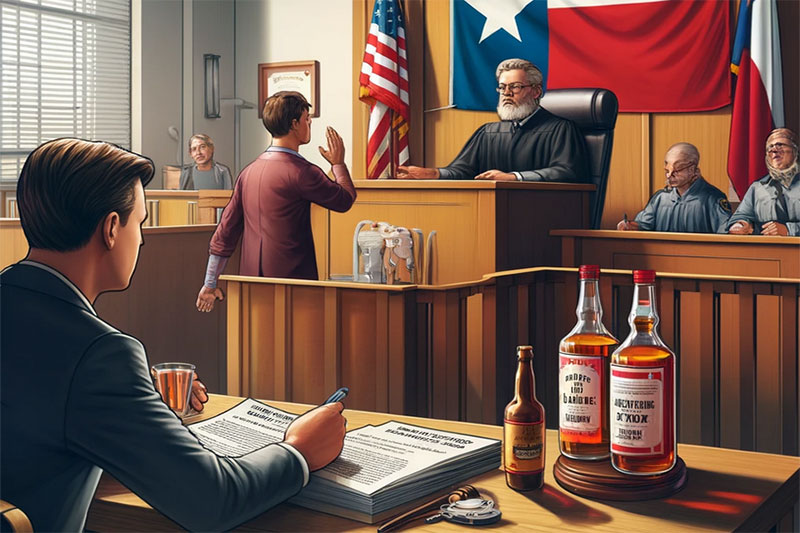Dram shop laws serve to hold establishments, such as bars and restaurants, accountable for serving alcohol to individuals who then cause harm to themselves or others due to their intoxication.

In Texas, these laws are outlined in the Texas Alcoholic Beverage Code, which sets the legal framework for determining the liability of businesses that serve alcohol. Establishments can potentially be held responsible for personal injuries and even wrongful deaths that occur as a result of over-serving alcohol to patrons.
While it might be challenging to prove that an establishment is directly responsible for an individual’s negligence or harmful actions, there are examples of situations in which the dram shop law in Texas has been successfully applied. For instance, if a bar continues to serve an intoxicated patron who then leaves the establishment and causes a vehicle accident, the bar may be held accountable for damages and injuries that result from the crash.
It is essential for victims of such incidents to understand their rights and seek legal advice from experienced personal injury attorneys in Texas. These professionals can help evaluate the situation, determine if there is a strong case against an establishment, and pursue compensation for injuries or losses related to the incident.
Understanding Dram Shop Laws in Texas
Basics of the Texas Dram Shop Act
The Texas Dram Shop Act is part of the Texas Alcoholic Beverage Code, which governs the sale and distribution of alcoholic beverages in the state. This set of laws establishes liability for establishments, such as bars and restaurants, that serve alcohol. The purpose of the Dram Shop Act is to hold these establishments accountable for serving alcohol to patrons who then cause injuries or damages due to their intoxication.
Criteria for Liability
In Texas, liability under the Dram Shop Act can be established if the following criteria are met:
- The bar or restaurant sold or served an alcoholic beverage to a visibly intoxicated person.
- The intoxication of the individual was the direct cause of the damages or injuries sustained.
It is important to note that Texas law also extends liability to establishments that serve alcohol to minors, even if the minor is not visibly intoxicated.
Differences Between Texas and Other States
While the underlying principles of holding establishments accountable for the actions of intoxicated patrons remain consistent across the United States, there are some key differences in Dram Shop laws from state to state.
Some states have stricter liability standards than Texas, requiring bars and restaurants to take greater precautions to prevent over-serving. On the other hand, a few states have more lenient standards, making it more challenging for injured parties to seek compensation from establishments.
The Texas Dram Shop Act establishes liability for bars, restaurants, and other establishments that serve alcohol to visibly intoxicated patrons or minors who subsequently cause personal injury or damages. This law aims to protect the public and encourage more responsible service of alcoholic beverages in the state. Texas values personal safety while maintaining a balanced approach to holding establishments accountable compared to other states.
Legal Actions and Consequences
Seeking Compensation through Litigation
If a person is injured or killed as a result of a bar or establishment negligently overspending alcohol to a patron, they may pursue compensation under Texas Dram Shop laws. The injured individual, or the family of the deceased, can file a lawsuit against the establishment for breaching their duty of care by serving alcohol to an obviously intoxicated patron who then caused harm. A knowledgeable personal injury attorney can help navigate the litigation process and assert the victim’s legal rights.
Potential Damages and Settlements
Victims or their families can seek compensation for a variety of damages caused by the negligence of an establishment under Dram Shop laws. These may include:
- Medical expenses: Cost of treatment and rehabilitation resulting from the injury
- Lost wages: Income lost due to the inability to work as a result of the injury
- Pain and suffering: Emotional and physical distress caused by the accident
- Loss of consortium: Loss of companionship, love, and support from the injured or deceased person
- Punitive damages: Additional compensation to punish especially negligent behavior, though rare in such cases
The final settlement amount may depend on various factors such as the extent of injury, liability, and insurance coverage of the establishment. Note that time is crucial, as there is a statute of limitations within which a lawsuit must be filed.
Role of Evidence in Dram Shop Cases
In order to prove negligence and establish dram shop liability in a case, strong evidence is essential. This can include:
- Surveillance footage: Video from the establishment showing the intoxicated patron being served alcohol
- Witness statements: Testimonies from employees or other patrons who observed the overserving
- Medical records: Documentation of the injuries sustained, treatments performed, and expenses incurred
- Expert opinion: Statements from experts, such as accident reconstruction specialists, alcohol safety consultants, or psychologists
Insurance companies, bar owners, or their legal teams may present various defenses to avoid liability. For example, they might assert that the intoxicated patron’s actions were unrelated to their level of intoxication or the establishment did not breach its duty of care when serving alcohol. A thorough compilation of evidence can play a pivotal role in overcoming such defenses and achieving a favorable outcome in litigation or settlement negotiations.
In Conclusion
Texas Dram Shop Laws aim to hold establishments, such as bars, accountable when they serve alcohol to obviously intoxicated persons who later cause harm or damages. The Texas Alcoholic Beverage Code outlines the specifics of this legal concept. It is important to be knowledgeable about the law and its implications for both establishments and victims of intoxicated individuals.
Establishments may face liabilities under the Dram Shop Law, which covers damages resulting from the serving of alcohol to an obviously intoxicated patron. Some of these potential damages include:
- Medical bills
- Lost wages
- Pain and suffering
- Loss of consortium or companionship
- Funeral expenses for wrongful death claims
The Texas Dram Shop Act was enacted in 1987, providing an exclusive remedy for liability arising from a provider’s negligence in over-serving obviously intoxicated individuals. However, Texas law also provides a “Safe Harbor” defense for establishments – under certain conditions – to protect them from liability in some cases.
In summary, the Texas Dram Shop Laws serve as a formidable check on alcohol-serving establishments, making them accountable for any damages caused by intoxicated patrons. It is essential for establishments to adhere to these laws and for affected individuals to be aware of the legal recourse available to them in case of such incidents.









